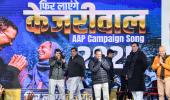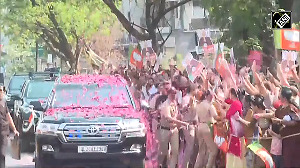The upcoming Delhi assembly polls have turned into a battleground of slangs, slogans, one-liners and AI-generated memes between the three main contenders -- the Aam Aadmi Party, the Bharatiya Janata Party and the Congress.

From the AAP branding the BJP as the "Bharatiya Jhootha Party" (Indian Liar Party) and "Gali Galouch Party" (Abusive Party) to Prime Minister Narendra Modi calling the AAP "AAP-Daa" (disaster) and Arvind Kejriwal the "Ghoshna Mantri" (minister of announcements) -- the war of words has taken centre stage.
Not to be left behind, the Congress has dubbed Kejriwal "Farziwal" (fake) and a "Chhota Recharge" (small recharge) of Modi.
As political rhetoric intensifies, memes, one-liners and spoofs dominate the discourse, making the polls as much about narrative control as governance.
Seeking a third straight term in power in Delhi, the Aam Aadmi Party has coined terms like the "Bharatiya Jhootha Party" to target the BJP for allegedly failing to deliver on its promises, such as creating two crore jobs annually.
Terming the Bharatiya Janata Party's tax regime "tax terrorism", AAP chief Kejriwal recently released a seven-point "manifesto" focusing on the middle class and alleging that the saffron party exploits this section for tax collection, without addressing their issues.
The AAP has countered the BJP's manifesto, challenging Kejriwal's USP to provide free welfare schemes and even surpassing it in some instances, and dismissed the "Sankalp Patra" as "Vinash Patra" (letter of destruction) while questioning its promises.
The AAP has also termed the BJP "Ravan Bhakt" (devotees of Ravan), while portraying itself as "Ram Bhakt" (devotees of Ram), citing law-and-order issues in the national capital.
The AAP has also labelled the saffron party as the "Gali Galouch Party", referring to controversial remarks made by BJP leaders like Ramesh Bidhuri and Shehzad Poonawala.
Punjab Chief Minister Bhagwant Mann, known for his comedic background before venturing into politics, is bringing his signature humour to Delhi's election campaign.
Encouraging voters to press the "jhadoo" (broom, the AAP's poll symbol) button on February 5, Mann has humorously warned them to avoid even glancing at the BJP's "lotus" symbol, saying, "If you even look at their symbol, you might get 'motiyabind' (cataract) from their corruption."
On the other hand, the BJP has gone on the offensive, leveraging its national leadership's star power to counter the AAP's narrative.
Modi has termed AAP "AAP-Daa", alleging mismanagement and corruption during Kejriwal's tenure as the Delhi chief minister.
The BJP has also coined the phrase "Ghoshna Mantri" for Kejriwal, accusing him of making endless promises ahead of the February 5 polls.
Borrowing a line from a song in Bollywood movie "Bunty Aur Babli", the saffron party has come up with "Aisa koi saga nahi, jisko mahathug ne thaga nahi" (There is no relative who was not cheated by this thug), alleging rampant corruption under the AAP's 10-year rule in the national capital.
The BJP has also labelled Kejriwal a "Chunavi Hindu" (Hindu only during elections) for his recent promises to grant Rs 18,000 monthly to priests and gurdwara granthis.
Meanwhile, though struggling to regain relevance, the Congress has sharpened its attacks on both the AAP and BJP.
It has labelled Kejriwal as "Farziwal" and a "Chhota Recharge" of Modi, accusing him of adopting the BJP's tactics.
Through its campaign "AAP ke Paap ka Pardafash" (AAP's misdeeds exposed) and frequently referring to Kejriwal as a "behroopia" (imposter), the Congress hopes to draw the people's attention to the alleged shortcomings of both its rivals.
The fiery exchange of slogans has spilt over onto social media platforms, with supporters from all camps engaging in meme wars and creative spoofs.
While these tactics have entertained some voters, opinions are divided regarding this meme-fest -- some perceive it as light-hearted humour, while others consider it a decline in the country's political discourse.
With the poll results set to be announced on February 8, the elections are being viewed as a referendum on the AAP's governance model, which emphasises free welfare schemes.
The ruling party faces a stiff competition from a resurgent BJP that is seeking to return to power in the capital after a gap of more than 25 years.
The Congress, although a long shot, hopes to regain its lost ground.
In the 2015 election, the AAP secured a landslide victory with 67 of the 70 seats, leaving just three for the BJP, while the Congress drew a blank. In 2020, the AAP retained its dominance with 62 seats, the BJP winning eight and the Congress failing to open its account again.
This time, with the BJP exuding confidence and the Congress attempting a revival, Delhi could witness one of its most fiercely-contested elections yet.
The poll results will determine whether the battle of words translates into votes or leaves Delhi's political landscape unchanged.











 © 2025
© 2025